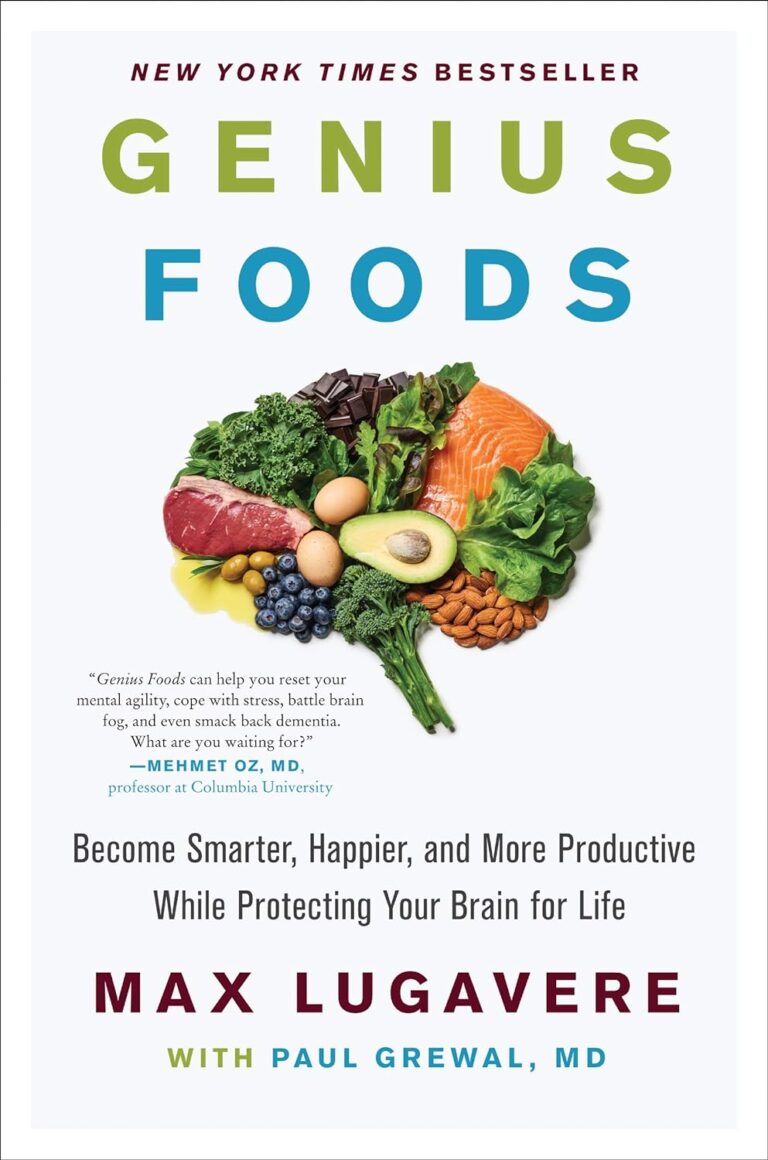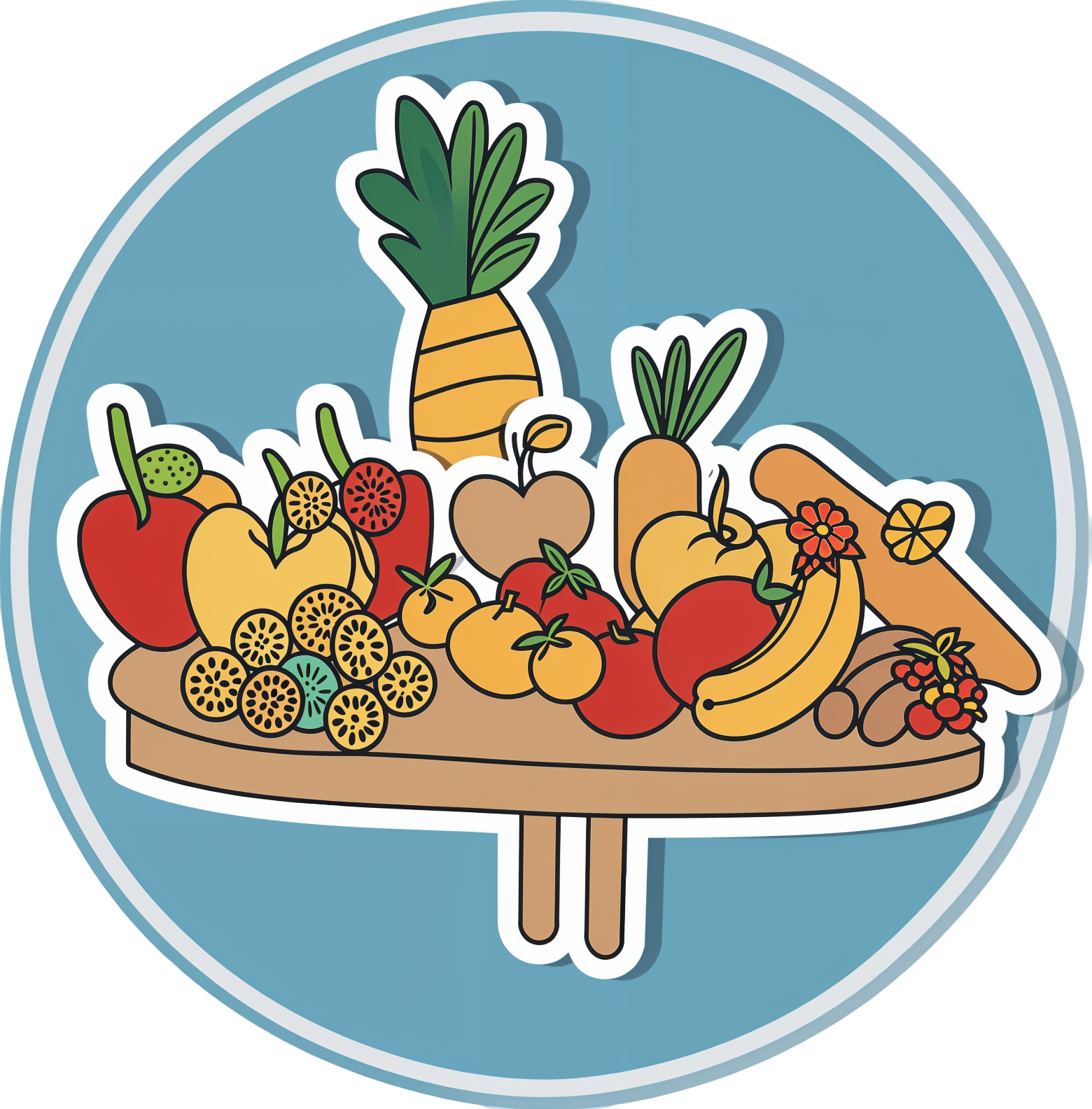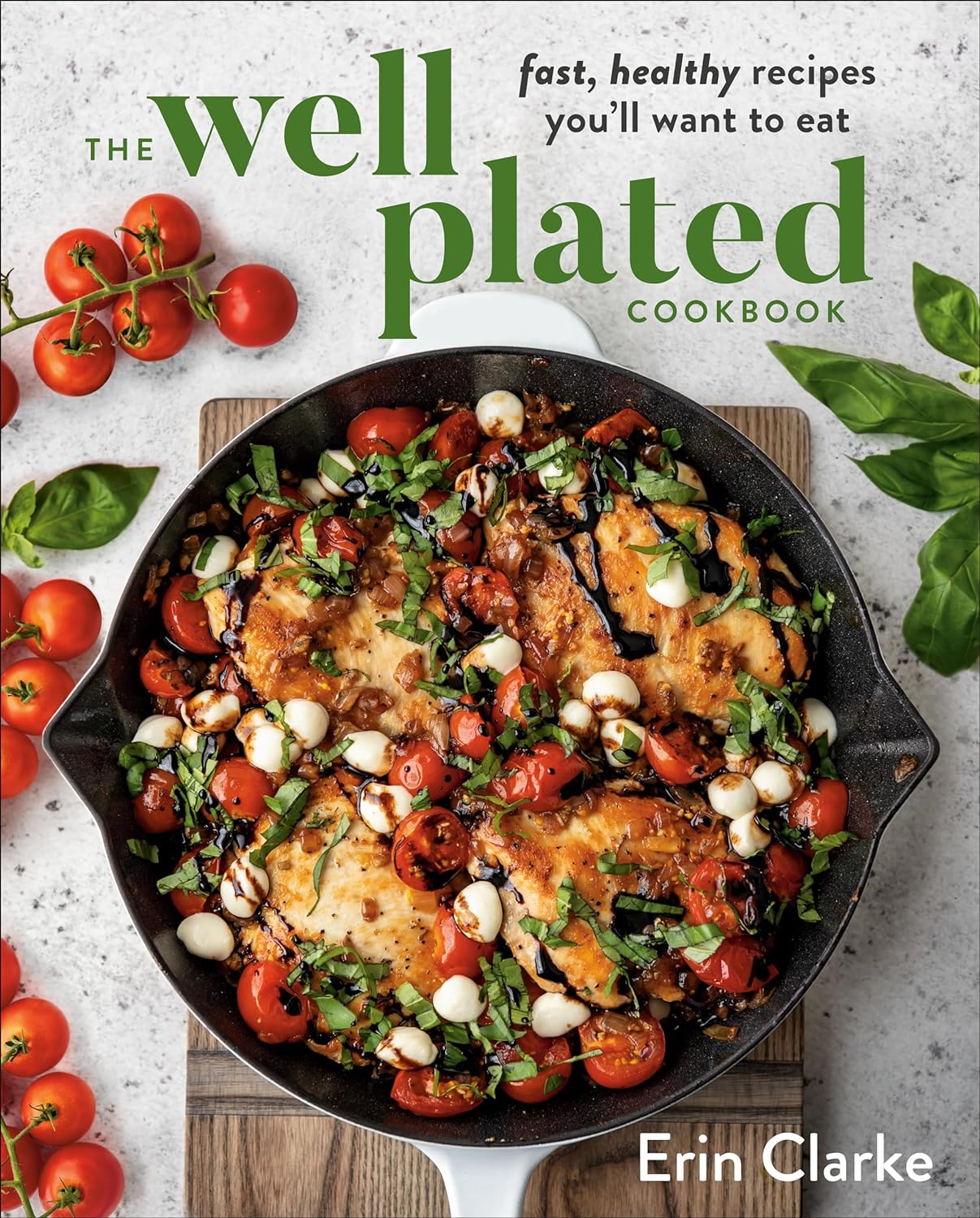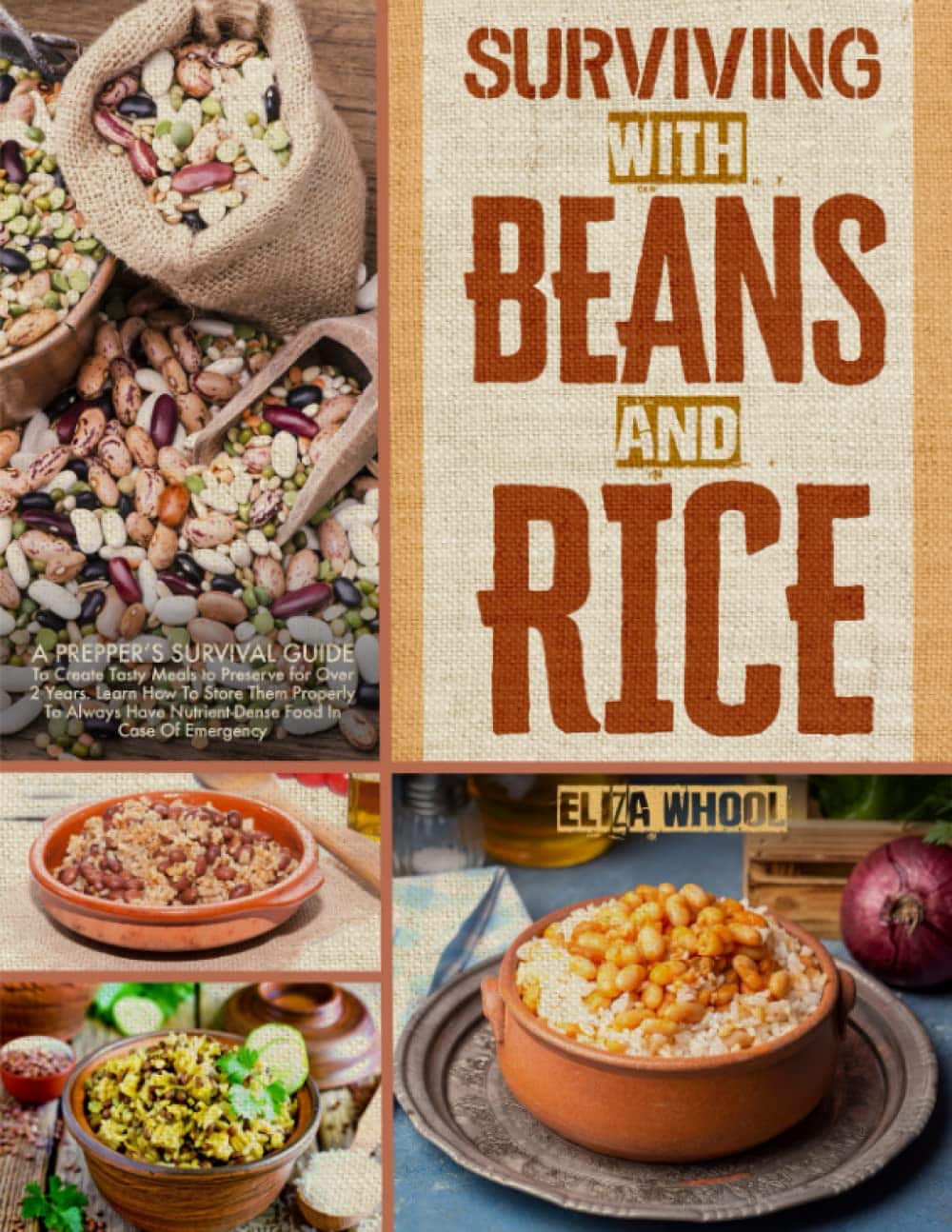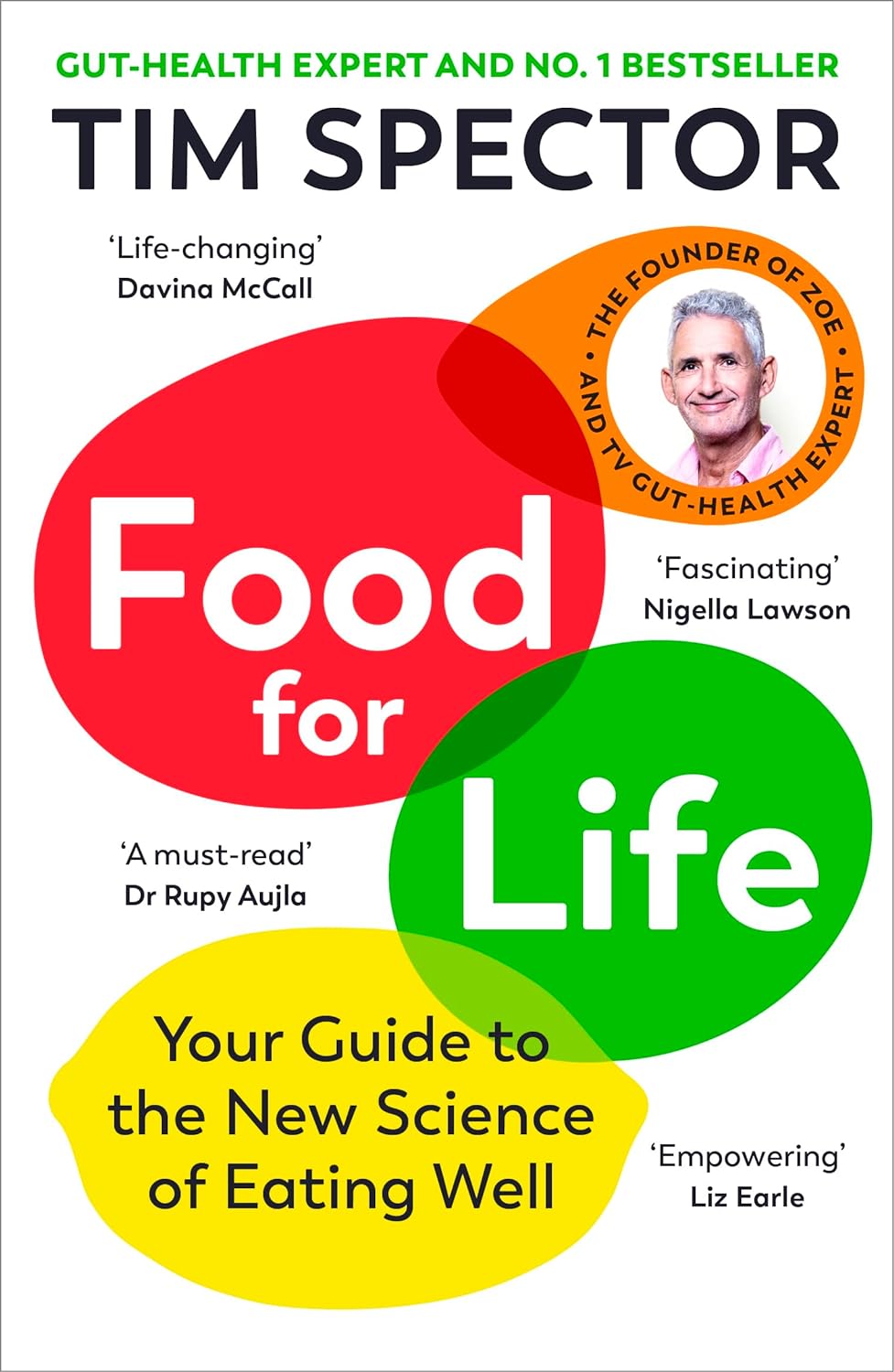
Food for Life – by Dr. Tim Spector
10almonds is reader-supported. We may, at no cost to you, receive a portion of sales if you purchase a product through a link in this article.
This book is, as the author puts it, “an eater’s guide to food and nutrition”. Rather than telling us what to eat or not eat, he provides an overview of what the latest science has to say about various foods, and leaves us to make our own informed decisions.
He also stands firmly by the “personalized nutrition” idea that he introduced in his previous book which we reviewed the other day, and gives advice on what tests we might like to perform.
The writing style is accessible, without shying away from reference to hard science. Dr. Spector provides lots of information about key chemicals, genes, gut bacteria, and more—as well as simply providing a very enjoyable read along the way.
Bottom line: if you’d like a much better idea of what food is (and isn’t) doing what, this book is an invaluable resource.
Click here to check out Food for Life, and make the best decisions for you!
Don’t Forget…
Did you arrive here from our newsletter? Don’t forget to return to the email to continue learning!
Recommended
Learn to Age Gracefully
Join the 98k+ American women taking control of their health & aging with our 100% free (and fun!) daily emails:
-
Does PRP Work For Hair Loss?
10almonds is reader-supported. We may, at no cost to you, receive a portion of sales if you purchase a product through a link in this article.
Dr. Ankit Gupta takes us through the details of this hair loss remedy for androgenic alopecia.
The bald truth
Platelet-Rich Plasma (PRP) is a controversial treatment for androgenic hair loss.
What it involves: blood is drawn and separated using a centrifuge. PRP—including growth proteins and hormones—is extracted from the blood; about 30 ml of blood is needed to produce 5 ml of PRP. This is then injected directly into the scalp. As this can be painful, local anaesthetic is sometimes used first. This usually involves monthly sessions for the first 3 months, then booster sessions every 3–6 months thereafter.
Does it work? Research is young; so far 60% of trials have found it worked; 40% found it didn’t. When it works, effectiveness (in terms of hair restoration) is considered to be between 25–43%. Results are inconsistent and seem to vary from person to person.
In short, this doctor’s recommendation is to consider it after already having tried standard treatments such as finasteride and/or minoxidil, as they are more likely to work and don’t involve such exciting procedures as injecting your own blood extracts back into your head.
For more on all of this, plus links to the 13 papers cited, enjoy:
Click Here If The Embedded Video Doesn’t Load Automatically!
Want to learn more?
You might also like to read:
- Hair-Loss Remedies, By Science
- Hair Growth: Caffeine and Minoxidil Strategies
- Gentler Hair Health Options
Take care!
Share This Post
-
The Whys and Hows of Cutting Meats Out Of Your Diet
10almonds is reader-supported. We may, at no cost to you, receive a portion of sales if you purchase a product through a link in this article.
When it’s time to tell the meat to beat it…
Meat in general, and red meat and processed meat in particular, have been associated with so many health risks, that it’s very reasonable to want to reduce, if not outright eliminate, our meat consumption.
First, in case anyone’s wondering “what health risks?”
The aforementioned culprits tend to turn out to be a villain in the story of every second health-related thing we write about here. To name just a few:
- Processed Meat Consumption and the Risk of Cancer: A Critical Evaluation of the Constraints of Current Evidence from Epidemiological Studies
- Red Meat Consumption (Heme Iron Intake) and Risk for Diabetes and Comorbidities?
- Health Risks Associated with Meat Consumption: A Review of Epidemiological Studies
- Associations of Processed Meat, Unprocessed Red Meat, Poultry, or Fish Intake With Incident Cardiovascular Disease and All-Cause Mortality
- Meat consumption: Which are the current global risks? A review of recent (2010-2020) evidences
Seasoned subscribers will know that we rarely go more than a few days without recommending the very science-based Mediterranean Diet which studies find beneficial for almost everything we write about. The Mediterranean Diet isn’t vegetarian per se—by default it consists of mostly plants but does include some fish and a very small amount of meat from land animals. But even that can be improved upon:
- A Pesco-Mediterranean Diet With Intermittent Fasting
- Mediterranean, vegetarian and vegan diets as practical outtakes of EAS and ACC/AHA recommendations for lowering lipid profile
- A Mediterranean Low-Fat Vegan Diet to Improve Body Weight and Cardiometabolic Risk Factors: A Randomized, Cross-over Trial
So that’s the “why”; now for the “how”…
It’s said that with a big enough “why” you can always find a “how”, but let’s make things easy!
Meatless Mondays
One of the biggest barriers to many people skipping the meat is “what will we even eat?”
The idea of “Meatless Mondays” means that this question need only be answered once a week, and in doing that a few Mondays in a row, you’ll soon find you’re gradually building your repertoire of meatless meals, and finding it’s not so difficult after all.
Then you might want to expand to “meat only on the weekends”, for example.
Flexitarian
This can be met with derision, “Yes and I’m teetotal, apart from wine”, but there is a practical aspect here:
The idea is “I will choose vegetarian options, unless it’s really inconvenient for me to do so”, which wipes out any difficulty involved.
After doing this for a while, you might find that as you get more used to vegetarian stuff, it’s almost never inconvenient to eat vegetarian.
Then you might want to expand it to “I will choose vegan options, unless it’s really inconvenient for me to do so”
Like-for-like substitutions
Pretty much anything that can come from an animal, one can get a plant-based version of it nowadays. The healthiness (and cost!) of these substitutions can vary, but let’s face it, meat is neither the healthiest nor the cheapest thing out there these days either.
If you have the money and don’t fancy leaping to lentils and beans, this can be a very quick and easy zero-effort change-over. Then once you’re up and running, maybe you can—at your leisure—see what all the fuss is about when it comes to tasty recipes with lentils and beans!
That’s all we have time for today, but…
We’re thinking of doing a piece making your favorite recipes plant-based (how to pick the right substitutions so the meal still tastes and “feels” the same), so let us know if you’d like that? Feel free to mention your favorite foods/meals too, as that’ll help us know what there’s a market for!
You can do that by hitting reply to any of our emails, or using the handy feedback widget at the bottom!
Curious to know more while you wait?
Check out: The Vegan Diet: A Complete Guide for Beginners ← this is a well-sourced article from Healthline, who—just like us—like to tackle important health stuff in an easy-to-read, well-sourced format
Share This Post
-
The Well Plated Cookbook – by Erin Clarke
10almonds is reader-supported. We may, at no cost to you, receive a portion of sales if you purchase a product through a link in this article.
Clarke’s focus here is on what she calls “stealthy healthy”, with the idea of dishes that feel indulgent while being great for the health.
The recipes, of which there are well over 100, are indeed delicious and easy to make without being oversimplified, and since she encourages the use of in-season ingredients, many recipes come with a “market swaps” substitution guide, to make each recipe seasonal.
The book is largely not vegetarian, let alone vegan, but the required substitutions will be second-nature to any seasoned vegetarian or vegan. Indeed, “skip the meat sometimes” is one of the advices she offers near the beginning of the book, in the category of tips to make things even healthier.
Bottom line: if you want to add dishes to your repertoire that are great for entertaining and still super-healthy, this book will be a fine addition to your collection.
Click here to check out The Well Plated Cookbook, and get cooking!
Share This Post
Related Posts
-
Surviving with Beans And Rice – by Eliza Whool
10almonds is reader-supported. We may, at no cost to you, receive a portion of sales if you purchase a product through a link in this article.
If you’d like to be well-set the next time a crisis shuts down supply lines, this is one of those books you’ll want to have read.
Superficially, “have in a large quantity of dried beans and rice” is good advice, but obvious. Why a book?
Whool gives a lot of advice on keeping your nutrition balanced while subsisting on the same quite few ingredients, which is handy.
More than that, she offers 100 recipes using the ingredients that will be in your long-term pantry. That’s over three months without repeating a meal! And if you don’t think rice and beans can be tasty and exciting and varied, then most of the chefs of the Global South might want to have a word about that.
Anyway, we’re not here to sell you rice and beans (we’re just enthusiastic and correct). What we are here to do is to give you a fair overview of this book.
The recipes are just-the-recipes, very simple clear instructions, one two-page spread per recipe. Most of the book is devoted to these. As a quick note, it does cover making things gluten-free if necessary, and other similar adjustments for medical reasons.
The planning-and-storage section of the book is helpful too though, especially as it covers common mistakes to avoid.
Bottom line: this is a great book, and remember what we said about doing the things now that future you will thank you for!
Get yourself a copy of Surviving with Beans And Rice from Amazon today!
Don’t Forget…
Did you arrive here from our newsletter? Don’t forget to return to the email to continue learning!
Learn to Age Gracefully
Join the 98k+ American women taking control of their health & aging with our 100% free (and fun!) daily emails:
-
If Your Adult Kid Calls In Crisis…
10almonds is reader-supported. We may, at no cost to you, receive a portion of sales if you purchase a product through a link in this article.
Parent(s) To The Rescue?
We’ve written before about the very common (yes, really, it is common) phenomenon of estrangement between parents and adult children:
Family Estrangement & How To Fix It
We’ve also written about the juggling act that can be…
Managing Sibling Relationships In Adult Life
…which includes dealing with such situations as supporting each other through difficult times, while still maintaining healthy boundaries.
But what about when one’s [adult] child is in crisis?
When a parent’s job never ends
Hopefully, we have not been estranged (or worse, bereaved) by our children.
In which case, when crisis hits, we are likely to be amongst the first to whom our children will reach out for support. Naturally, we will want to help. But how can we do that, and where (if applicable) to draw the line?
No “helicopter parenting”
If you’ve not heard the term “helicopter parenting”, it refers to the sort of parents who hover around, waiting to swoop in at a moment’s notice.
This is most often applied to parents of kids of university age and downwards, but it’s worth keeping it in mind at any age.
After all, we do want our kids to be able to solve their own problems if possible!
So, if you’ve ever advised your kid to “take a deep breath and count to 10” (or even if you haven’t), then, consider doing that too, and then…
Listen first!
If your first reaction isn’t to join them in panic, it might be to groan and “oh not again”. But for now, quietly shelve that, and listen to whatever it is.
See also: Active Listening (Without Sounding Like A Furby)
And certainly, do your best to maintain your own calm while listening. Your kid is in all likelihood looking to you to be the rock in the storm, so let’s be that.
Empower them, if you can
Maybe they just needed to vent. If so, the above will probably cover it.
More likely, they need help.
Perhaps they need guidance, from your greater life experience. Sometimes things that can seem like overwhelming challenges to one person, are a thing we dealt with 20 or more years ago (it probably felt overwhelming to us at the time, too, but here we are, the other side of it).
Tip: ask “are you looking for my guidance/advice/etc?” before offering it. Doing so will make it much more likely to be accepted rather than rejected as unsolicited advice.
Chances are, they will take the life-ring offered.
It could be that that’s not what they had in mind, and they’re looking for material support. If so…
When it’s about money or similar
Tip: it’s worth thinking about this sort of thing in advance (now is great, if you have adult kids), and ask yourself nowwhat you’d be prepared to give in that regard, e.g:
- if they need money, how much (if any) are you willing and able to provide?
- if they want/need to come stay with you, how prepared are you for that (including: if they want/need to actually move back in with you for a while, which is increasingly common these days)?
Having these answers in your head ready will make the conversation a lot less difficult in the moment, and will avoid you giving a knee-jerk response you might regret (in either direction).
Have a counteroffer up your sleeve if necessary
Maybe:
- you can’t solve their life problem for them, but you can help them find a therapist (if applicable, for example)
- you can’t solve their money problem for them, but you can help them find a free debt advice service (if applicable, for example)
- you can’t solve their residence problem for them, but you can help them find a service that can help with that (if applicable, for example)
You don’t need to brainstorm now for every option; you’re a parent, not Batman. But it’s a lot easier to think through such hypothetical thought-experiments now, than it will be with your fraught kid on the phone later.
Magic words to remember: “Let’s find a way through this for you”
Don’t forget to look after yourself
Many of us, as parents, will tend to not think twice before sacrificing something for our kid(s). That’s generally laudable, but we must avoid accidentally becoming “the giving tree” who has nothing left for ourself, and that includes our mental energy and our personal peace.
That doesn’t mean that when our kid comes in crisis we say “Shh, stop disturbing my personal peace”, but it does mean that we remember to keep at least some boundaries (also figure out now what they are, too!), and to take care of ourselves too.
The following article was written with a slightly different scenario in mind, but the advice remains just as valid here:
How To Avoid Carer Burnout (Without Dropping Care)
Take care!
Don’t Forget…
Did you arrive here from our newsletter? Don’t forget to return to the email to continue learning!
Learn to Age Gracefully
Join the 98k+ American women taking control of their health & aging with our 100% free (and fun!) daily emails:
-
You’re Not Forgetful: How To Remember Everything
10almonds is reader-supported. We may, at no cost to you, receive a portion of sales if you purchase a product through a link in this article.
Elizabeth Filips, medical student busy learning a lot of information, explains how in today’s video:
Active processing
An important thing to keep in mind is that forgetting is an active process, not passive as once believed. It has its own neurotransmitters and pathways, and as such, to improve memory, it’s essential to understand and manage forgetting.
So, how does forgetting occur? Memories are stored with cues or tags, which help retrieve information. However, overloading cues with too much information can cause “transient forgetting”—that is to say, the information is still in there somewhere; you just don’t have the filing system required to retrieve the data. This is the kind of thing that you will try hard to remember at some point in the day when you need it, fail, and then wake up at 3am with an “Aha!” because your brain finally found what you were looking for. So, to avoid that, use unique and strong cues to help improve recall (mnemonics are good for this, as are conceptual anchors).
While memory does not appear to actually be finite, there is some practical truth in the “finite storage” model insofar as learning new information can overwrite previous knowledge, iff your brain mistakes it for an update rather than addition. So for that reason, it’s good to periodically go over old information—in psychology this is called rehearsal, which may conjure theatrical images, but it can be as simple as mentally repeating a phone number, a mnemonic, or visually remembering a route one used to take to go somewhere.
Self-perception affects memory performance. Negative beliefs about one’s memory can worsen performance (so don’t say “I have a bad memory”, even to yourself, and in contrast, find more positive affirmations to make about your memory), and mental health in general plays a significant role in memory. For example, if you have ever had an extended period of depression, then chances are good you have some huge gaps in your memory for that time in your life.
A lot of what we learned in school was wrong—especially what we learned about learning. Traditional (vertical) learning is harder to retain, whereas horizontal learning (connecting topics through shared characteristics) creates stronger, interconnected memories. In short, your memories should tell contextual stories, not be isolated points of data.
Embarking on a new course of study? Yes? (If not, then why not? Pick something!)
It may be difficult at first, but experts memorize things more quickly due to built-up intuition in their field. For example a chess master can glance at a chess board for about 5 seconds and memorize the position—but only if the position is one that could reasonably arise in a game; if the pieces are just placed at random, then their memorization ability plummets to that of the average person, because their expertise has been nullified.
What this means in practical terms: building a “skeleton” framework before learning can enhance memorization through logical connections. For this reason, if embarking on a serious course of study, getting a good initial overview when you start is critical, so that you have a context for the rest of what you learn to go into. For example, let’s say you want to learn a language; if you first quickly do a very basic bare-bones course, such as from Duolingo or similar, then even though you’ll have a very small vocabulary and a modest grasp of grammar and make many mistakes and have a lot of holes in your knowledge, you now have somewhere to “fit” every new word or idea you learn. Same goes for other fields of study; for example, a doctor can be told about a new drug and remember everything about it immediately, because they understand the systems it interacts with, understand how it does what it does, and can compare it mentally to similar drugs, and they thus have a “place” in that overall system for the drug information to reside. But for someone who knows nothing about medicine, it’s just a lot of big words with no meaning. So: framework first, details later.
For more on all this, enjoy:
Click Here If The Embedded Video Doesn’t Load Automatically!
Want to learn more?
You might also like to read:
How To Boost Your Memory Immediately (Without Supplements)
Take care!
Don’t Forget…
Did you arrive here from our newsletter? Don’t forget to return to the email to continue learning!
Learn to Age Gracefully
Join the 98k+ American women taking control of their health & aging with our 100% free (and fun!) daily emails:

